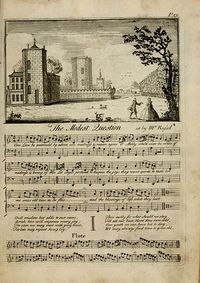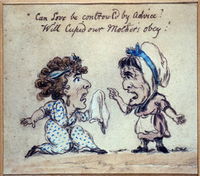Annotation:Modest Question (The): Difference between revisions
m (Text replacement - "garamond, serif" to "sans-serif") |
No edit summary |
||
| Line 1: | Line 1: | ||
---------- | |||
---- | {{TuneAnnotation | ||
|f_tune_annotation_title= https://tunearch.org/wiki/Annotation:Modest_Question_(The) > | |||
'''MODEST QUESTION, THE.''' English, Air (3/4 time). G Major. Standard tuning (fiddle). AABBCCDD. The song appears in the second volume of John Simpson's '''Caliope, or English Harmony''' (London, 1746, p. 66), John Sadler's '''The Muses Delight''' (Liverpool, 1756), '''The London Songster, or Polite Musical Companion''' (1767), and similar songsters. The lyric begins: | |f_annotation='''MODEST QUESTION, THE.''' English, Air (3/4 time). G Major. Standard tuning (fiddle). AABBCCDD. The song appears in the second volume of John Simpson's '''Caliope, or English Harmony''' (London, 1746, p. 66), John Sadler's '''The Muses Delight''' (Liverpool, 1756), '''The London Songster, or Polite Musical Companion''' (1767), and similar songsters. The lyric begins: | ||
[[File:modest.jpg|200px|thumb| | [[File:modest.jpg|200px|thumb|right|The song as it appears in '''Universal harmony or, the gentleman and ladie's social companion''']] | ||
<blockquote> | <blockquote> | ||
''Can love be controul'd by advice,''<br> | ''Can love be controul'd by advice,''<br> | ||
| Line 27: | Line 27: | ||
</blockquote> | </blockquote> | ||
This version appears in Allan Ramsay's '''Tea-Table Miscellany''' (p. 418). | This version appears in Allan Ramsay's '''Tea-Table Miscellany''' (p. 418). | ||
|f_source_for_notated_version= | |||
|f_printed_sources= Thumoth ('''12 English and 12 Irish Airs with Variations'''), c. 1745; No. 3, p. 6-7. | |||
|f_recorded_sources= | |||
|f_see_also_listing= | |||
}} | |||
Latest revision as of 20:50, 4 June 2024
X:1 T:Modest Question, The M:3/4 L:1/8 R:Air B:Burk Thumoth - 12 English and 12 Irish Airs with Variations (c. 1745, No. 3, p. 6-7) Z:AK/Fiddler's Companion K:G V:1 G2|d2 (cB)(AG)|A(cBAGF)|(G>A)B2D2|E2D2G2|{AB}c2 BABc| (B2A2) (A>B/2c/4)|BA G2 (B>^c/2d/4)|(^cB)A2G2|F2TG2A2|{g}f2 ed^cB| A>B(AFGE)|D4:||:FG/A/)|D2D2 (GA/B/)|D2D2 dB|(B2A2)G2 (F2TG2)A2|{cd}e2 (dcBA)| B4 D2|E2 cBAG|F2 dcBA|G2 edcB|c4 Ac|(BdcBAG)|gedBcA|G4:| |:"Variation"G2|{Bc}d2 cBAG|(3ABc (3BcA (3GAF|(G>A)B2D2|{F}E2 D2G2|(A/B/c) (B/A/G) (e/d/c)|TB2A2 (A>B/2c/4)| (B/G/F/G/) TG2 (B/G/B/d/)|(c/B/A) A2TG2|F/D/TF G/D/TG A2|{g}f2 (3efd (3^cdB|A>B A/(B/A/F/) B/(G/F/E/)| {E}D4:||:FG/A/|.D.D (D/F/E/D/) (G/B/A/G/)|D2D/(F/E/D/) (e/d/c/B/)|B2( A/G/F)G2|F/F/TF G/G/TG A2| {cd}e2 (3dec (3BcA|TB4D2|E/(G/F/E/) (c/B/A/G/) (A/G/F/E/)|(F/A/G/F/) (d/c/B/A/) (B/A/G/F/)| (G/A/B/c/) (d/e/f/g/) (e/d/c/B/)|!fermata!{B}Tc4 (A/B/c)|(B/c/d) (3cdB (3ABG|ge (e/d/c/B/) (d/c/B/A/)|G6:|] V:2 clef = bass z2|G,,4B,,2|C,2D,2D,,2|G,,4B,,2|C,2B,,2B,2|A,2G,2G,,2| D,2D,,2F,2|G,2G,,2E,2|A,2A,,2^C,2|D,6|D,4E,2| F,G,A,2A,,2|D,4:|z2|D,2D,,2z2|D,2D,,2z2|D,2D,,2B,,2|A,,2B,,2C,2|A,,2D,2D,,2| G,,2B,,2G,,2|C,2A,,2C,2|D,2B,,2D,2|E,2C,2A,,2|F,,4F,,2|G,,2A,,2B,,2|C,2D,2D,,2|G,,4:| |:z2|G,,4B,,2|C,2D,2D,,2|G,,4B,,2}C,2B,,2B,2|A,2G,2G,,2|D,2D,,2F,2| G,2G,,2E,2|A,2A,,2^C,2|D,6|D,4E,2|F,>G, A,2A,,2| D,4:||:z2|D,2D,,2z2|D,2D,,2z2|D,2D,,2B,,2|A,,2B,,2C,2| A,2D,2D,,2|G,,2B,,2G,,2|C,2A,,2C,2|D,2B,,2D,2| E,2C,2A,,2|!fermata!F,,4F,,2|G,,2A,,2B,,2|C,2D,2D,,2|G,,6:|
MODEST QUESTION, THE. English, Air (3/4 time). G Major. Standard tuning (fiddle). AABBCCDD. The song appears in the second volume of John Simpson's Caliope, or English Harmony (London, 1746, p. 66), John Sadler's The Muses Delight (Liverpool, 1756), The London Songster, or Polite Musical Companion (1767), and similar songsters. The lyric begins:

Can love be controul'd by advice,
Can madness and reason agree?
O Molly! who'd ever be wife,
If madness is loving of thee?
Let sages pretend to despise
The joys they want spirits to taste;
Let me seize old Time as he flies,
And the blessings of life while they last.
A song from the Beggar's Opera (1729), set to the tune of "Grim King of the Ghosts" has the same first line:

Can love be controul'd by advice?
Will Cupid our mothers obey?
Though my heart were as frozen as ice,
At his flame, 'twould have melted away,
When he kist me so closely he prest,
'Twas so sweet that I must have comply'd:
So I thought it both safest and best,
To marry for fear you shou'd chide.
This version appears in Allan Ramsay's Tea-Table Miscellany (p. 418).

